
Today, March 31, 2019, Aruna Roy, Harsh Mander, John Dayal, Ram Puniyani Syeda Hameed and Shabnam Hashmi released the book ‘India in Communal Grip’ written by Ram Puniyani at the Constitution Club of India. The program was attended by a large number of intellectuals, activists and young people.
Book ‘India in Communal Grip’ is published by Seethai Pathipagam, Chennai , It has 12 chapters, 210 pages, ISBN No: 978-93-88697-36-1, price Rs 200/-
The book outlines the last five years of Modi’s rule. Ram Puniyani writes about Modi’s ascent to power and how conditions were created by the rise of RSS in 1980s, ideological indoctrination, Gujarat 2002 violence, Gujarat Model and Hindutva electoral strategy that helped Modi reach the centre with the agenda of the Hindu-Rashtra camouflaged in development rhetoric. The book looks at the pattern of power, the earlier slogans of Achhe Din, the changing mindsets and increasing polarization in the society, early signals of authoritarianism and symptoms of Fascism. Various strategies to achieve the goal of the Hindutva Rashtra are discussed which include maligning the legacy of Jawaharlal Nehru, glorifying Godse. The book looks in detail at the anatomy of riots especially analyzing Basirhat (West Bengal) and Kasganj violence, using polarization to win election in UP, using Lord Ram for electoral gains. It also talks about Hadiya’s case and freedom of choice, Ghar Wapasi, Cow politics, cow vigilantes, lynchings, attacks on Dalits in Una. Author also discusses the attack on rationalists and the killings of Dabholkar, Kalburgi, Pansare and Gauri Lankesh.
The book looks at the condition of Muslim women and how communal politics has been played in the name of Muslim women. The book has chapters on handling of Kashmir issue by the BJP, education agenda, communal historiography, it looks at demonetization also.
Puniyani writes “Modi’s winning 2014 Loksabha elections with a simple majority (282 MPs with 31% of vote share) was a landmark in the history of India. This gave him nearly 52% of Lok Sabha seats. BJP was in alliance with partners like Shiv Sena, Ramvilas Paswan’s party etc. The elections saw a major media spectacle, with catchy phrases like ‘Aab Ki baar Modi Sarkar’, (This time it will be Modi Government) Acche Din Aane Wale hain (Good Days will come), Bahut Hui Mahangai ki Maar-Aab ji bar Modi sarkar (Too Much rising Prices-Now Modi Government) and so on. Lakhs of RSS volunteers were on the streets campaigning for BJP, Corporate World had opened all its coffers for BJP like never before. The jubilation in the RSS combine touched the sky. This was the first time that BJP had simple majority on its own. Earlier BJP had come to power thrice. First, as a single largest single party in 1996, then as NDA coalition in 1998 and 1999 they came to power. Since it did not have simple majority, it kept its Hindutva agenda under the wraps, while facilitating the RSS wings and swayamsevaks to infiltrate in the portals of society and state.
Ram Puniyani asserts that the authoritarianism witnessed during Emergency regime of Indira Gandhi can in no way be compared to what is being witnessed currently. In Emergency authoritarianism was on display, it was mainly implemented from top down, administrative measure. The current one under Modi is imposed through the foot soldiers, through soliciting its imposition through a section of society, a layer of society is in strong support of the current intimidation and suppression of liberal ethos of society. The RSS associates are in the driving seat. The present regime is not just authoritarian. While Hindu nationalist ideology is one pillar of the corporate controlled economy is the other. The overall atmosphere of growing intimidation speaks of the times to come.
‘India in Communal Grip’ comprehensively covers our times and Modi’s misrule and is an important book for young students as well as politicians and ordinary citizens. While releasing the book Shabnam Hashmi said that the need of hour is to defeat the party with Hindu nationalist agenda, the BJP. Harsh Mander recounted the increase in Hate in society and the efforts of Karawan-E-Mohabbat in assuaging the wounds of families of victims. Aruna Roy called for the need to strengthening of movements for democracy and need to defeat communal forces in society. John Dayal in his remarks pointed out that hate against minorities is on the rise and there is a need to combat this. Syeda Hamid elaborated the effort of book to present the rational aspects of history and need to spread logical awareness in the society.
There was a lively question answer session in which the real threat of BJP’s coming to power again was elaborated by the author.
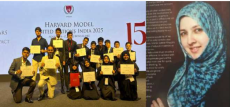 Iqra International School’s historic debut at Harvard Model UN 2025, a great opportunity to build the capacity of students: Noor Ayesha
Iqra International School’s historic debut at Harvard Model UN 2025, a great opportunity to build the capacity of students: Noor Ayesha
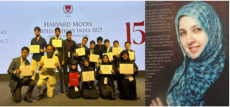 हार्वर्ड मॉडल यूएन में इकरा इंटरनेशनल स्कूल का ऐतिहासिक पदार्पण, छात्रों की क्षमता निर्माण का एक शानदार अवसर: नूर आयशा
हार्वर्ड मॉडल यूएन में इकरा इंटरनेशनल स्कूल का ऐतिहासिक पदार्पण, छात्रों की क्षमता निर्माण का एक शानदार अवसर: नूर आयशा
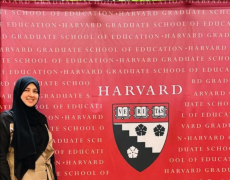 बैंगलोर की पुरस्कार विजेता शिक्षाविद् नूर आयशा को हार्वर्ड विश्वविद्यालय में स्नातकोत्तर अध्ययन में प्रवेश मिला
बैंगलोर की पुरस्कार विजेता शिक्षाविद् नूर आयशा को हार्वर्ड विश्वविद्यालय में स्नातकोत्तर अध्ययन में प्रवेश मिला
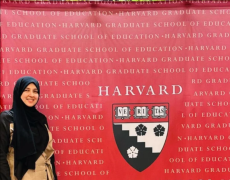 Award-winning educationist Noor Ayesha from Bangalore Gains Admission to Harvard University's Postgraduate Program
Award-winning educationist Noor Ayesha from Bangalore Gains Admission to Harvard University's Postgraduate Program
 प्रसिद्ध कैंसर सर्जन डॉ. माजिद अहमद तालिकोटी को भारत-जीसीसी व्यापार परिषद द्वारा मानद स्वास्थ्य आयुक्त नियुक्त किया गया
प्रसिद्ध कैंसर सर्जन डॉ. माजिद अहमद तालिकोटी को भारत-जीसीसी व्यापार परिषद द्वारा मानद स्वास्थ्य आयुक्त नियुक्त किया गया
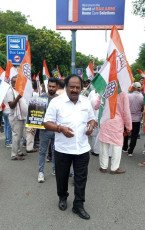 दिल्ली कांग्रेस का बुलडोजर न्याय, जलभराव, गरीबों को उजाड़ने और बिगड़ती कानून-व्यवस्था के खिलाफ प्रदर्शन
दिल्ली कांग्रेस का बुलडोजर न्याय, जलभराव, गरीबों को उजाड़ने और बिगड़ती कानून-व्यवस्था के खिलाफ प्रदर्शन
